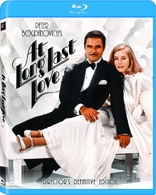At Long Last Love Blu-ray Movie
HomeAt Long Last Love Blu-ray Movie 
20th Century Fox | 1975 | 123 min | Rated G | Jun 04, 2013Movie rating
6.7 | / 10 |
Blu-ray rating
| Users | 0.0 | |
| Reviewer | 3.5 | |
| Overall | 3.5 |
Overview
At Long Last Love (1975)
Writer-director Peter Bogdanovich's daring experiment in direct-sound musical, AT LONG LAST LOVE is a charming pastiche of superb Cole Porter songs woven together to tell a gossamer tale of life among the idle rich. The romantic roundelay is peopled by a carefree playboy (Burt Reynolds), a madcap heiress (Cybill Shepherd), a Broadway diva (Madeline Kahn), and an Italian gambler (Duilio Del Prete); a pair of wised-up servants (John Hillerman, Eileen Brennan) provide a little perspective.
Starring: Burt Reynolds, Cybill Shepherd, Madeline Kahn, Eileen Brennan, John HillermanDirector: Peter Bogdanovich
| Romance | Uncertain |
| Musical | Uncertain |
| Comedy | Uncertain |
Specifications
Video
Video codec: MPEG-4 AVC
Video resolution: 1080p
Aspect ratio: 1.67:1
Original aspect ratio: 1.66:1
Audio
English: DTS-HD Master Audio Mono
Music: DTS-HD Master Audio 2.0
Subtitles
English SDH
Discs
25GB Blu-ray Disc
Single disc (1 BD)
Playback
Region A, B (C untested)
Review
Rating summary
| Movie | 3.0 | |
| Video | 4.0 | |
| Audio | 4.0 | |
| Extras | 1.5 | |
| Overall | 3.5 |
At Long Last Love Blu-ray Movie Review
At Long Last (Which?) 'At Long Last Love'.
Reviewed by Jeffrey Kauffman June 14, 2013For many younger filmgoers (and especially home video enthusiasts), Peter Bogdanovich is simply the slightly
pretentious, ascot wearing commentator who is prone to drop into quite convincing impersonations of everyone from
Alfred Hitchcock to Orson Welles to Cary Grant whilst opining about this film or that. But for a while at least,
Bogdanovich was considered the equal of such
directing talents as Martin Scorsese and Francis Ford Coppola. Rather like Coppola, Bogdanovich started his directing
career with a rather inauspicious B-movie debut, the hilariously awful Voyage to the Planet of the Prehistoric
Women, starring erstwhile sex bomb Mamie Van Doren. But later in that same year of 1968 Bogdanovich started to
prove his mettle with the rather interesting Targets, a frighteningly prescient examination of a public mass
shooter that
featured Boris Karloff. (Again, like some of Coppola’s early efforts, Targets bore the imprimatur of Roger
Corman.) Bogdanovich lay fallow for the next three years or so, but when he reappeared, it was with a vengeance.
1971’s The Last Picture Show (available on Blu-ray in the America Lost and Found: The BBS Story box collection) set
the film world on its ear and immediately established Bogdanovich as a force to be reckoned with. And then
Bogdanovich did something rather odd—instead of further establishing himself as a burgeoning auteur, he set
off on a series of pastiches, films obviously meant to evoke bygone eras and genres. First up was
Bogdanovich’s
take on screwball comedy, What's Up, Doc?
. Then came another kind of homage to Howard Hawks (and perhaps Frank Capra), his Depression era
comedy Paper Moon. All of these films were huge hits at the box office and two out of the three were
fêted with Academy Awards, which would have seemed to have set Bogdanovich up to be the leading director of
his generation, or at the very least one of them.
But a little thing called “love” had gotten in the way when
Bogdanovich had cast the young model Cybill Shepherd in The Last Picture Show and had then proceeded on to
a torrid affair with her, something that eventually put the kibosh on Bogdanovich’s marriage to Polly Platt. Much like the
efforts of one Charles Foster Kane vis a vis his girlfriend in Bogdanovich’s idol Orson Welles’ Citizen Kane, Bogdanovich sought to
establish Shepherd as one of the leading dramatic actresses of her era (stop giggling, please) and thus was born
Bogdanovich’s first all out disaster, Daisy Miller (a film which actually plays at least a little better than it was
given credit for back in the day). Not content to have simultaneously blown his chance to create an Artistic (capital A)
literary adaptation and having made Shepherd something of a laughingstock, Bogdanovich went on to his
second unmitigated failure which further sought to establish Shepherd as a singing and dancing star (no, really,
you have to stop giggling). At
Long Last Love was supposed to be Bogdanovich’s mash note to the big Hollywood musical, but it was
excoriated by critics and was sliced and diced almost beyond recognition within just a few days of its theatrical
premiere, to the point that Bogdanovich pretty much washed his hands of it, deciding it was better to never look back.
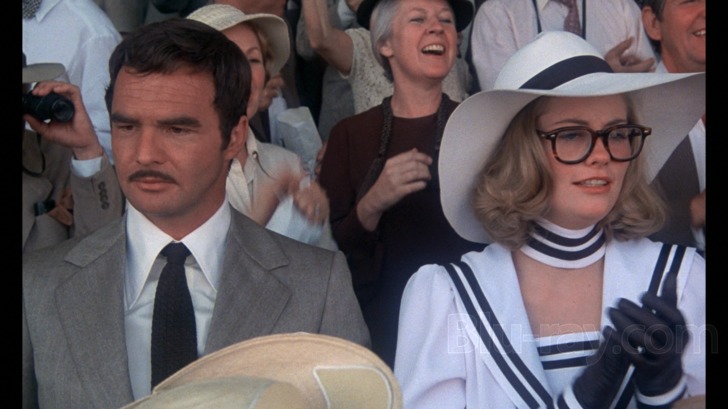
Say what you will about Bogdanovich’s self-indulgences, in a way he was rather prescient, for in 1975 no one had really heard of a “jukebox musical”. In those days when unrelated numbers by one composer or composing team were strung together, it was called a revue, and there typically was no plot. Bogdanovich took about a dozen and a half Cole Porter tunes (including some fairly rare ones) and wove an admittedly flimsy plot around them that dealt with two couples who interchange partners and find true love (or something like that). But perhaps this gambit was a non-starter to begin with for two reasons. First of all, the connective tissue between these songs isn’t even Kleenex quality—it’s more like the house brand you buy to save a few pennies and then immediately regret having picked up. And second of all, as outlined above, a lot of these songs are not the Porter tunes that the vast majority of the general populace know and love. This is musical theater for elitists, and unfortunately that niche won’t buy many tickets, as Bogdanovich found out, much to his dismay.
The four main characters in At Long Last Love are bored millionaire Ollie Pritchard III (Burt Reynolds), newly destitute heiress Brooke Carter (Cybill Shepherd), blowsy chanteuse Kitty O’Kelly (Madeline Kahn) and playboy-gambler “Johnny Spanish” (Duilio Del Prete). The film actually starts out pairing Ollie with Kitty and Brooke with Johnny, but one look at the above the title stars lets you in on the final arrangement pretty much before the film has even begun. And here, too, Bogdanovich’s personal feelings may have gotten in the way of his better instincts. Neither Shepherd nor (especially) Reynolds is a very authoritative singer. Shepherd actually went on to establish herself in her later years as at least a passable jazz singer, and has long claimed she was a singer even before she was a model, let alone an actress, but her attempts to bring a legitimate musical theater voice to her work here largely fall flat, figuratively and even occasionally literally. She’s not horrible by any stretch, but she’s not remarkable, either. Reynolds unfortunately is even worse, kind of grunting his songs out in what almost sounds like a parody of Dean Martin after a few (maybe even more than a few) too many drinks.
That leaves the heavy lifting, musicianship wise, to Kahn, who had an elegantly trained soprano, but who is here limited largely to comedic material, and Del Prete, a man who had had some success in his native Italy with his own pop material, but who here, much like Shepherd, doesn’t quite know what to make of a traditional musical comedy milieu. In fact, quite a bit of At Long Last Love comes off as the very sincere attempts by a gaggle of people who obviously love musicals, but find that the genre is not exactly their métier. Some of the best material here is the non-musical comedy elements added by a great supporting cast which includes the always reliable John Hillerman, Eileen Brennan and Mildred Natwick.
Bogdanovich stages things at least decently most of the time and excels in a couple of standout sequences, including “De-Lovely” and the title tune, which plays like a musical comedy version of a scene of the ruling class right out of Renoir’s The Rules of the Game (I kid, but only slightly). The best parts of At Long Last Love are the gorgeous production design, which Bogdanovich created to be “black and white in color”, as well as the lively and often innovative orchestrations, courtesy of the old guard (Lionel Newman) and the young turk (Artie Butler). Lovers of Porter’s oeuvre will probably be quite surprised with some of the inventive arrangements, which include a waltz rendition of the normally stolidly 4/4 “I Get a Kick Out of You”.
At Long Last Love has had a rather checkered history. Cut almost beyond recognition within mere moments after its initial release, it seemed to have disappeared—only, did it? Various versions showed up here and there, including some on broadcast television, each of them seemingly slightly different from each other. Bogdanovich kept getting approached by people who had seen it and loved it, something that evidently pleased but slightly confused the director, confusion stemming at least in part from wondering which version any given person had seen. Bogdanovich finally caught a version himself one day, and was stunned to see something that resembled but did not entirely match his first preview cut, something that had been discarded decades earlier. The punch line to this conundrum came a bit later, when it was revealed that a Fox employee named James Blakely had reedited the film himself, creating (rather incredibly) something that Bogdanovich liked better than either his original cut or the butchered versions that came after it. You can read a fascinating history of the film told by Bogdanovich himself, including the astounding discovery of the "unauthorized" but well done edit, here.
At Long Last Love Blu-ray Movie, Video Quality 

At Long Last Love is presented on Blu-ray courtesy of 20th Century Fox Home Entertainment with an AVC encoded 1080p transfer in 1.67:1. This film has not only been presented in multiple versions, it evidently has been presented in at least a few aspect ratios. I confess I can't recall what the aspect ratio was when I saw the film theatrically on a couple of occasions (in two different versions), but I don't see any egregious framing errors here that would suggest 1.67:1 (or, more likely, 1.66:1) was not the intended aspect ratio. The elements here are in largely pristine shape, with a couple of notable exceptions. The first two numbers of the film were excised at one point, and there's some noticeable damage, albeit slight, that resembles print through and which crawls up the center part of the frame, especially when the backgrounds are white. Much later, at around 1:26:10, the reprise of "From Alpha to Omega" has been restored, and that footage is really ragged looking, almost to the point that it looks like it was blown up from a 16mm print. The image is rather soft here and very, very grainy. Otherwise, though, there's a lot to celebrate. Generally speaking for the vast bulk of the film, the image is reasonably sharp, though legendary cinematographer Laszlo Kovacks deliberately keeps things soft at times, with an emphasis on diffused light that only helps the "black and white in color" scheme to achieve some pop. Colors are nicely saturated most of the time, though I personally wish contrast had been boosted a little, especially since the film favors a rather monochromatic palette.
At Long Last Love Blu-ray Movie, Audio Quality 
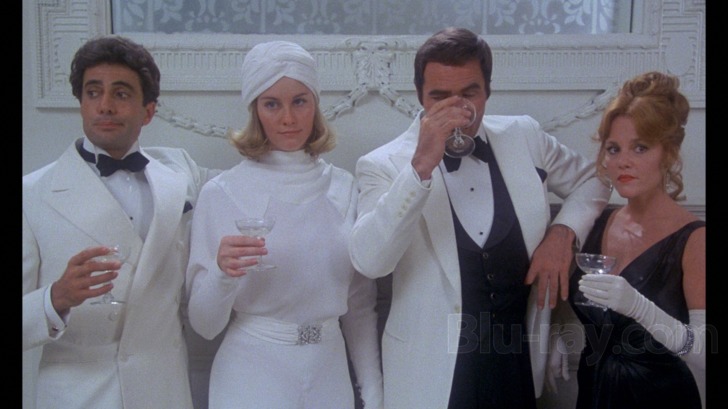
At Long Last Love features a lossless DTS-HD Master Audio Mono track that quite ably supports the film's original sound design. The mono track is fairly narrow, obviously (just toggling over to the isolated 2.0 score offers a wealth of more nuanced orchestral presence). Both dialogue and singing are presented with very good fidelity, though some of the restored material evidences just very slight distortion at times. The film's stellar orchestrations by Newman and Butler sound fantastic.
At Long Last Love Blu-ray Movie, Special Features and Extras 
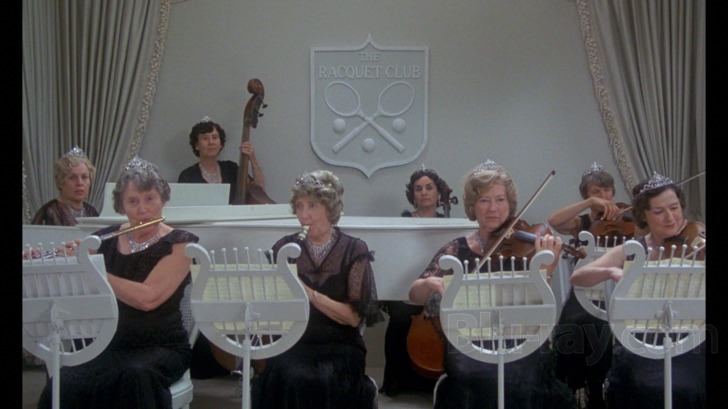
- Original Theatrical Trailer (480i; 3:25)
- Isolated Score. This was originally announced as a Twilight Time release, and so it bears that label's hallmark of an isolated score track, presented via DTS-HD Master Audio 2.0. Rather interestingly, while the track is mostly instrumental, you can still barely make out vocals in the background on some of these tunes. Since this film was notable for having featured "live" singing during filming, I'm wondering if these were "scratch" tracks done by the vocalists to help set orchestral tempi, and then mixed down to minimal volume so that the performers could "really" sing during filming. (Some of the restored footage features vocals along with the orchestral backing, since they were obviously taken from secondary elements.)
At Long Last Love Blu-ray Movie, Overall Score and Recommendation 
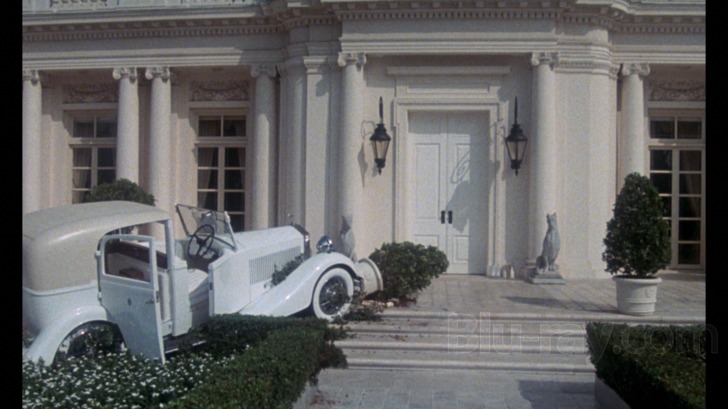
I love musicals and in fact I've made part of my living conducting musicals for years, so it's with some sadness that I must confess that I truly don't find At Long Last Love some misunderstood masterpiece. It's an often winning, breezy attempt at recreating the fabled Astaire-Rogers days of yore, but it tries too hard most of the time, and it's hobbled by a paper thin plot and two leads who really should have sung better. The film is still a lot of fun to watch, especially for Kahn, Brennan and Natwick. The production design is outstanding and the orchestrations and arrangements are also top rate. Fans would have probably preferred a release with as much excised material as possible included as supplements (those of us who have seen various versions theatrically or on television can probably name a favorite tune or two that isn't in this cut). Otherwise, though, this Blu-ray offers nice looking video and sounding audio and comes Recommended.
Similar titles
Similar titles you might also like

Funny Lady
Limited Edition to 3000 - SOLD OUT
1975

The Gay Divorcee
1934

On Moonlight Bay
Warner Archive Collection
1951

Top Hat
1935

42nd Street
Warner Archive Collection
1933

Swing Time
1936

Victor/Victoria
1982

The Boy Friend
Warner Archive Collection
1971

Mamma Mia! Here We Go Again
Sing-Along Edition
2018

Grease 4K
40th Anniversary Edition
1978

State Fair
1945

Royal Wedding
1951

Lullaby of Broadway
Warner Archive Collection
1951

Finian's Rainbow
Warner Archive Collection
1968

The Band Wagon
1953

A Star Is Born
1976

The Gang's All Here
Limited Edition to 3000
1943

Bells Are Ringing
Warner Archive Collection
1960

Girl Crazy
Warner Archive Collection
1943

Second Chorus
Swing Romance
1940
